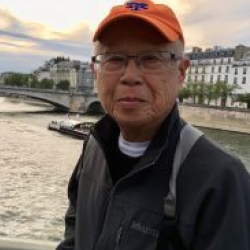
Jeffery Paul Chan, M.A.
1942-2022
Jeffery Paul Chan, Emeritus Professor of Asian American Studies, was an author and founding member of the Asian American Studies Department and the College of Ethnic Studies at San Francisco State University in 1969. With appointments in both Asian American Studies and English, he taught courses in basic writing skills, Asian American Literatures, and creative writing from 1969 until his retirement in 2006. He also served multiple terms as AAS department chairperson during the most challenging times for the department.
This factual statement and Jeff's better known public face as author and educator obscures a greater truth - that Jeff’s work was fundamental to establishing the entire field of Asian American Studies and to the understanding of Asian American literature in particular. This assertion is rooted in the cultural and political realities he faced on teaching his first classes in Asian American Studies in 1969. At that time, any books about and by Asian Americans were rare, regardless of quality or perspective, and literary books by Asian Americans even fewer and largely out-of- print.
To address this situation, Jeff and his primary partners in crime - Frank Chin, Lawson Fusao Inada, and Shawn Wong - set out to find as many writings by Asian American authors as they could discover, published or not. They pressured publishers to reissue or republish works by people like Louis Chu, Toshiro Mori, John Okada, and Carlos Bulosan. They sought funding for the publication of new works by contemporary Asian American poets and writers and produced their own landmark book Aiiieeeee: An Anthology of Asian-American Writers. The publications of every Asian American author since is based on the foundations they built.
Their efforts also led to the Combined Asian-American Resources Project (CARP) - which sought to gather information not only on Asian American writers but on Asian American cultures in general. This sometimes mad-cap enterprise sought primary sources, recorded events like Bomb Day in Marysville, and interviewed people as varied as early Asian Americans engaged in Hollywood and the arts, and an elderly hom-yu (salt fish) maker in Monterey, and a long-established woman barber in Oakland Chinatown. Jeff, in particular, took great joy in discovering the subtleties of Chinese American English and the broad range of Asian American cultural expressions.
Through discussions with colleagues across ethnic, racial, disciplinary, and political lines, Jeff led the development of an analytical perspective on Asian American identities, cultures, and language as well as literature. That perspective asserted Asian American cultural expressions as standing in their own light, legitimate in their own right, rejecting the tradition of racialized cultural subordination in which these expressions were seen as pale shadows of Asian or White American cultures. This principle was and is central to the tradition of Asian American Studies at SFSU, indeed to Asian Americans Studies as a discipline, and is the foundation of the study of Asian American literature to this day.
Jeff was endlessly supportive of aspiring Asian American writers, while also providing precise critical guidance and was at the forefront in developing new Asian American writers and many of the creative activities and groups in Asian American communities, including Kearny Street Workshop and the Asian American Theater Workshop in San Francisco. His classes attracted and were popular with students who wished to explore their own experiences, communities, and history from a new perspective. Many of his students and teaching assistants went on to spark an Asian American cultural renaissance in creative writing and the arts.
His role in building and defending Asian American Studies at SF State is equally important. He drove the development of coursework related to Asian American literature and creative writing while helping to direct the larger creation of Asian American Studies at San Francisco State. Equally important, Jeff held the chairperson’s position for many of the most difficult periods, during which he courageously often faced the open hostility of the campus administration and larger campus anti-Ethnic Studies belligerence. He addressed and often resolved conflicting concerns of the highly involved students, community members, and faculty who were engaged in the construction and operation of the department. An essentially calm and gentle person with a wry wit and ever the diplomat, he was an adept consensus builder who brokered collective agreements over issues that might have otherwise jeopardized departmental unity, integrity, and even survival. He earned the respect and admiration of his colleagues in Asian American Studies, Ethnic Studies, and the larger campus community, and among the leading writers and artists of color, building lasting alliances and highly valued friendships along the way.
Professor Jeffery Paul Chan – A True Original.
Quick Links